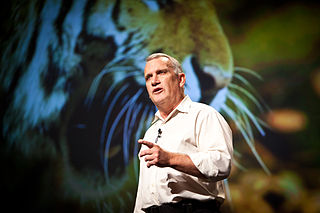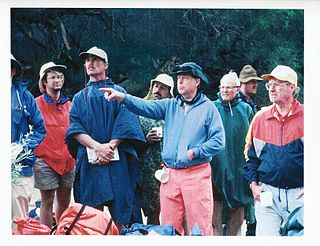Related Research Articles
Robert Kunzig is a scientific journalist, specializing in oceanography. He works at the European division of Discover magazine and is a regular contributor to National Geographic.
The BBC Studios Natural History Unit (NHU) is a department of BBC Studios that produces television, radio and online content with a natural history or wildlife theme. It is best known for its highly regarded nature documentaries, including The Blue Planet and Planet Earth, and has a long association with David Attenborough's authored documentaries, starting with 1979's Life on Earth.
Strange Days on Planet Earth is a four-part television program on PBS concerning human impact on the environment. It is narrated by Edward Norton. The show was produced by Sea Studios Foundation. Strange Days on Planet Earth grew into an ongoing partnership with the National Geographic Society to bring focus on our personal connection to the planet's life systems.

Seoul Train is a 2004 documentary film that deals with the dangerous journeys of North Korean defectors fleeing through or to China. These journeys are both dangerous and daring, since if caught, they face forced repatriation, torture, and possible execution.
Sea Studios Foundation is a 501(c)3 non-profit organization, headquartered in Monterey, California. Sea Studios was founded by Mark Shelley, a senior series producer for National Geographic. It is a team of filmmakers, scientists and public opinion leaders dedicated to raising public awareness and creating action on issues involving the planet’s health and sustainable development worldwide.

Alan Robert Rabinowitz was an American zoologist who served as the president, CEO, and chief scientist at Panthera Corporation, a nonprofit conservation organization devoted to protecting the world's 40 wild cat species. Called the "Indiana Jones of Wildlife Protection" by Time, he studied jaguars, clouded leopards, Asiatic leopards, tigers, Sumatran rhinos, bears, leopard cats, raccoons, cervidae, and civets.

David Sington is a British-born director, producer, screenwriter and author. He read Natural Sciences at Trinity College, Cambridge, graduating in 1981.

A Crude Awakening: The Oil Crash is a 2006 documentary film about peak oil, produced and directed by Basil Gelpke and Ray McCormack.

Galápagos is a three-part BBC nature documentary series exploring the natural history of the Galápagos Islands and their important role in the formation of Charles Darwin's theory of evolution. It was first transmitted in the UK on BBC Two in September 2006.

Fred F. Meissner was an American geologist and engineer who contributed to the fields of geology, geophysics, engineering, petroleum engineering, geochemistry, mineralogy, physics, mining, economic geology, and fishing.

James Honeyborne is the creative director of Freeborne Media, he previously worked as an executive producer at the BBC Natural History Unit where he oversaw some 35 films, working with multiple co-producers around the world. His projects include the Emmy Award and BAFTA-winning series Blue Planet II, the Emmy Award-nominated series Wild New Zealand with National Geographic, and the BAFTA-winning BBC1 series Big Blue Live with PBS.
Alan Stanley Kornacki is an American geologist and retired Army colonel, currently the Senior Staff Geochemist at Shell International Exploration and Production Inc. He received a B.S. in geology from the University of Missouri–Rolla in 1974 before completing his M.S. and Ph.D. in geology at Harvard University in 1984 on a Graduate Research Fellowship. His dissertation focused on refractory inclusions in carbonaceous chondrites. He began a career in the petroleum industry in 1985 when he joined Shell USA. In 1981, he was awarded the Nininger Meteorite Award, and in 2008, he was awarded a professional degree by the University of Missouri–Rolla. Alan Kornacki is most known for his characterization of wax from deep-water crude oil, an important obstacle in modern drilling and refining technology, and his research on new sources of hydrocarbons such as oil shale.
Montana State University’s Master of Fine Arts Program in Science & Natural History Filmmaking (SNHF), founded in 2000, continues to be the only MFA program of its kind in the world. It takes students with backgrounds in science, engineering, and technology and prepares them as filmmakers with the creative and critical skills necessary to produce work that contributes to the public understanding of science. Students in the program come from a wide variety of backgrounds including the physical sciences, the social sciences, engineering, technology, medicine, and law.

Yellowstone is a BBC nature documentary series broadcast from 15 March 2009. Narrated by Peter Firth, the series takes a look at a year in the life of Yellowstone National Park, examining how its wildlife adapts to living in one of the harshest wildernesses on Earth. Yellowstone debuted on BBC Two at 8:00pm on Sunday 15 March 2009 and has three episodes. Each 50-minute episode was followed by a ten-minute film called Yellowstone People, featuring visitors to the Park and locals who had assisted the production team. The series was the channel's highest-rated natural history documentary in over five years with audiences peaking at over four million.

The Meerkats, also known as Meerkats: The Movie, is a feature-length 2008 British wildlife fiction film which anthropomorphises the daily struggles of a clan of meerkats in the Kalahari Desert. It was produced by BBC Films, and filmed by the award-winning BBC Natural History Unit. It is the debut directorial feature of James Honeyborne, previously a producer of natural history programmes for television. The worldwide premiere was held at the Dinard Film Festival, France in October 2008, expanding to a wide release the following week. The film was released in 2009, on 7 August in the UK. The film was dedicated to Paul Newman, the narrator of the film, who died in 2008, shortly before this film was released making it his final film role.

The Disenchanted Forest is a 1999 documentary film that follows endangered orphan orangutans on the island of Borneo as they are rehabilitated and returned to their rainforest home. It centres on the three main Borneo Orangutan Survival Foundation (BOS) projects - Wanariset, Nyaru Menteng and Mawas. It is narrated by Brooke Shields.
GasHole is a documentary film about the history of oil prices and the future of alternative fuels. The film was completed in 2008, premiered and released directly to DVD in 2010. The film details the dependency of the United States on foreign supplies of oil. The documentary is directed by Scott D. Roberts and Jeremy Wagener and narrated by Peter Gallagher.
Barbara Sumner is a New Zealand writer and film producer. Tree of Strangers, her memoir of adoption, loss and discovery, was published by Massey University Press in September 2020.

Christopher Aiden-Lee Jackson is a British geoscientist, science communicator and Director of Sustainable Geoscience at Jacobs Engineering Group. He was previously Professor of Sustainable Geoscience at the University of Manchester, and before that held the Equinor Chair of Basin Analysis at Imperial College, London. He is known for his work in geoscience, especially in the use of 3D seismic data to understand dynamic processes in sedimentary basins.
Gunjan Menon is an Indian wildlife film director, camerawoman, and National Geographic Explorer.
References
- ↑ "Festival Winners, Jackson Hole Wildlife Film Festival". Archived from the original on 19 February 2009.
- ↑ "Smith Receives 2008 Walter Sullivan Award for Excellence in Science Journalism". Archived from the original on 8 July 2009. Retrieved 2 May 2009.